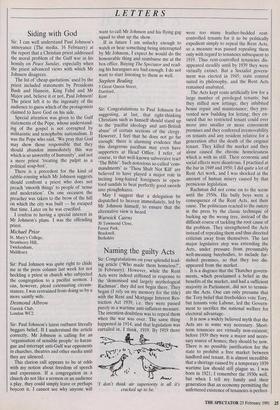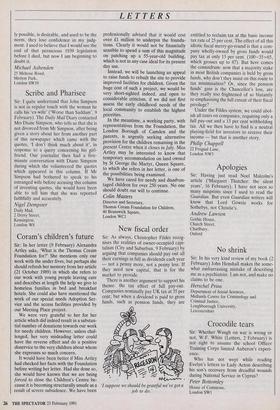Naming the guilty Acts
Sir: Congratulations on your splendid lead- ing article ('Who made them homeless?', 16 February). However, while the Rent Acts were indeed stiffened in response to the `demonised and largely mythological Rachman', they did not begin there. They began (I rely on my memory for the title) with the Rent and Mortgage Interest Res- triction Act 1939, i.e. they were passed purely as a wartime anti-inflation measure. The intention doubtless was to repeal them when the war was over. The same thing happened in 1914, and that legislation was curtailed in, I think, 1919. By 1919 there don't think air superiority is all it's cracked up to be.' were too many feather-bedded rent- controlled tenants for it to be politically expedient simply to repeal the Rent Acts, so a measure was passed repealing them only with regard to tenancies subsequent to 1919. Thus rent-controlled tenancies dis- appeared steadily until by 1939 they were virtually extinct. But a Socialist govern- ment was elected in 1945; state control suited its philosophy, and the Rent Acts remained unabated.
The Acts kept rents artificially low for a large number of privileged tenants; but they stifled new lettings; they inhibited house repair and maintenance; they pre- vented new building for letting; they en- sured that no restricted tenant could ever move into smaller or more convenient premises and they conferred irremovability on tenants and any resident relative for a generation after the death of the original tenant. They killed the market and they alone caused the chronic homelessness which is with us still. Their economic and social effects were disastrous. I practised at the bar in 1949 and 1950; I did quite a lot of Rent Act work, and I was shocked at the amount of human misery caused by that pernicious legislation.
Rachman did not come on to the scene until the 1950s. His bully boys were a consequence of the Rent Acts, not their cause. The politicians reacted to the outcry in the press by the classic technique of barking up the wrong tree, instead of the difficult course of tackling the root cause of the problem. They strengthened the Acts instead of repealing them and thus directed criticism away from themselves. The last major legislative step was extending the Acts, under pressure from presumably well-meaning busybodies, to include fur- nished premises, so that they too dis- appeared from the market.
It is a disgrace that the Thatcher govern- ments, which proclaimed a belief in the benefits of the market, and had a sufficient majority in Parliament, did not to termin- ate the Acts. One can only presume that the Tory belief that freeholders vote Tory, but tenants vote Labour, led the Govern- ment to sacrifice the national welfare for electoral advantage.
It is now a widely believed myth that the Acts are in some way necessary. Short- term tenancies are virtually non-existent; before 1939 they were a major and neces- sary source of homes; they should be now. There is no possible justification for the state to prohibit a free market between landlord and tenant. It is almost incredible that a shortage caused by a temporary 1939 wartime law should still plague us. I was born in 1921; I remember the 1930s well, but when I tell my family and their generation that an economy permitting the unfettered existence of tenancies is perfect-
LETTERS
ly possible, is desirable, and used to be the norm, they lose confidence in my judg- ment. I used to believe that I would see the end of that pernicious 1939 legislation before I died, but now I am beginning to doubt it.
Michael Ashenden 25 Melrose Road, Merton Park, London SW19



















































 Previous page
Previous page